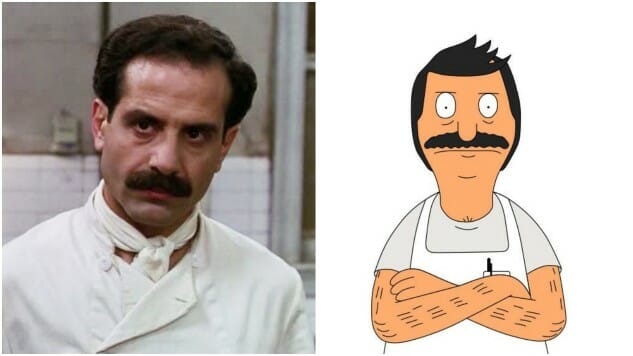Is Bob’s Burgers a Low-Key Adaptation of Stanley Tucci’s Movie Big Night?
Photo Courtesy of The Samuel Goldwyn Company / Fox
Bob’s Burgers will go down in history as one of the great animated series of the last decade, even though for much of its runtime the show consistently felt like it was flying under a lot of radars. But as time has gone by and the cult of Bob has become well established, and with a feature film (and Season 10!) both on the horizon, it’s become clear that the legacy of Bob’s Burgers is more than secure as a good-hearted, family centric sitcom that combined the humor of peak-era Simpsons with the down-to-earth character building of King of the Hill. But did you know Bob’s Burgers has some serious roots in a film that most fans of the series have likely never seen?
Being a food geek and a cinephile, it was inevitable that I eventually get around to watching Stanley Tucci and Campbell Scott’s well-loved 1996 dramedy Big Night. It was a case of one of those films I’d been aware of for years, but never made the time to watch. Still, as it routinely appeared in lists I’d read with titles like “the best films about food,” or had recipes reenacted by the likes of Binging with Babish, I eventually decided that I’d waited long enough. It was time to check out this film. Little did I know that I’d be watching the foundations of Bob’s Burgers at the same time.
As my fiancé and I watched Big Night, we slowly became aware of the seeming connection. There are elements of this film that seem incredibly pertinent to the situation of Bob, his family, and his struggling restaurant. Around the halfway point, another element is introduced that hammers the point home: Big Night is a prototype for Bob and the Belchers. Wondering if I was the only one who’d made this connection, I went searching online for references to the two series together, which were mostly inconsequential—save for one. In an interview way back in 2013, series creator Loren Bouchard does specifically discuss the similarities between the two series, and how he was inspired in part by Tucci’s film. And so, my suspicions were confirmed—but now I need to share this connection with the world, because it’s too neat to stay under wraps.
Big Night is the story of two Italian brothers, Primo (Tony Shalhoub) and Secondo (Tucci), who are operating a troubled restaurant called Paradise in 1950s New Jersey. The trouble is by no means the quality of their offerings, as Chef Primo’s authentic, history-steeped Italian delights are deeply satisfying to all who go out of their way to sample them. Rather, the restaurant is failing due to the unwillingness of Primo to simplify his food and serve the basic “pasta and red sauce” expected by the dim-witted American masses who dine in the area, unfamiliar as they are with classical Italian cooking. Although Primo’s risotto and other dishes are divine, diners are confused and repelled by them, instead asking him if they can get “a side of spaghetti and meatballs,” much to Shaloub’s consternation. Nonetheless, even when business manager Secondo tries to gently nudge his brother in the direction of compromising his purity as a chef—such as taking expensive risotto off the menu—Primo is unwilling to back down an inch. He would rather make spectacular food and fail, than make lesser food and be a success.
Primo, as if we needed to say it, is the model for none other than Bob Belcher. Bob, like Primo, makes truly exceptional food within his own sphere. The quality of Bob’s burger creations is acknowledged by everyone who tries them. Where the business struggles is in getting people through the door, not the least because Bob’s wacky family has a tendency to drive away potential customers.
Like Primo, Bob is a perfectionist, a person who is willing to go above and beyond for his craft. Creating food isn’t just something he does to make a living; it’s how he expresses himself as a person, as seen in his love of cooking elaborate Thanksgiving dinners for his family. At the same time, the restaurant’s lack of success is frustrating and embarrassing for him, and there’s a constant temptation to take the easier route to greater financial stability. Bob could skimp on the quality of his ingredients, or add items or promotions that would appeal to the lowest common denominator, but like Primo, he has too much integrity to do it. The two also share other similarities as well: They’re both dour personalities who can be a bit on the gruff side, aren’t very good with customers, and don’t seem to be very good with managing money. They even share the same mustache!
-

-

-

-

-

-

-

-

-

-

-

-

-

-

-

-

-

-

-

-

-

-

-

-

-

-

-

-

-

-

-

-

-

-

-

-

-

-

-

-









































